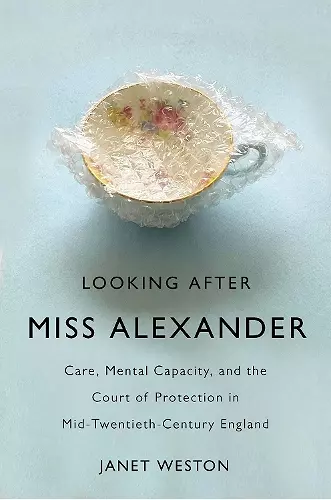Looking After Miss Alexander
Care, Mental Capacity, and the Court of Protection in Mid-Twentieth-Century England
Format:Paperback
Publisher:McGill-Queen's University Press
Published:15th Jan '23
Should be back in stock very soon

One woman’s encounter with the mental capacity law of England and Wales.
In 1939, fifty-nine-year-old Beatrice Alexander was found incapable of managing her own property and affairs, despite her claims that she was perfectly well. A history of mental capacity law in twentieth-century England and Wales, Looking After Miss Alexander examines ideas of mental illness, citizenship, care, and the role of the state.
In July 1939, at the Royal Courts of Justice in London, fifty-nine-year-old Beatrice Alexander was found incapable of managing her own property and affairs. Although Alexander and those living with her insisted that she was perfectly well, the official solicitor took control of her home and money, evicted her “friends,” and hired a live-in companion to watch over her. Alexander remained legally incapable for the next thirty years.
In the mid-twentieth century, Alexander was one of about thirty thousand people in England and Wales who were, at any time, legally “incapable” and under the auspices of what is now the Court of Protection. Focusing on the period between the 1920s and the 1960s, Looking After Miss Alexander explains the workings of the court, using Alexander’s unusual case to consider the complexities of this aspect of mental health law. Drawing on Court of Protection archives – some of which were made publicly available for the first time in 2019 – and micro-historical methods, Janet Weston also highlights the role of chance, subjectivity, and uncertainty in shaping how events unfolded then, and the stories we tell about those events today.
An engaging and accessible history of mental capacity law, Looking After Miss Alexander examines ideas of citizenship and welfare, gender and vulnerability, care and control, and the role of the state. It also offers reflections on historical research and writing itself.
“Weston built her book masterfully on the ‘small story’ of Miss Alexander, recognising the gaps in knowledge due to incomplete archival material. The gaps, as well as the story, create a base for discussion of themes such as personal autonomy, vulnerabilities, care and control, as well as challenges for historians, such as about dealing with ambiguities and filling gaps using imagination or speculation.” The Social History of Medicine
"Looking after Miss Alexander is an unusual and interesting book, beautifully written. This microhistory explores key issues within disability studies such as care, independence, illness, capacity, citizenship and vulnerability, raising important questions on how mental health was assessed in mid-20th century Britain. A sensitive portrayal of the experience of Miss Alexander, this rigorous study of mental/intellectual disability sets a new standard for how historians talk and write about disability." Disability History Book Award jury
- Winner of Disability History Association 2024 Outstanding Book Award
- Law and Society Association 2024, Honourable Mention
ISBN: 9780228014683
Dimensions: unknown
Weight: unknown
192 pages